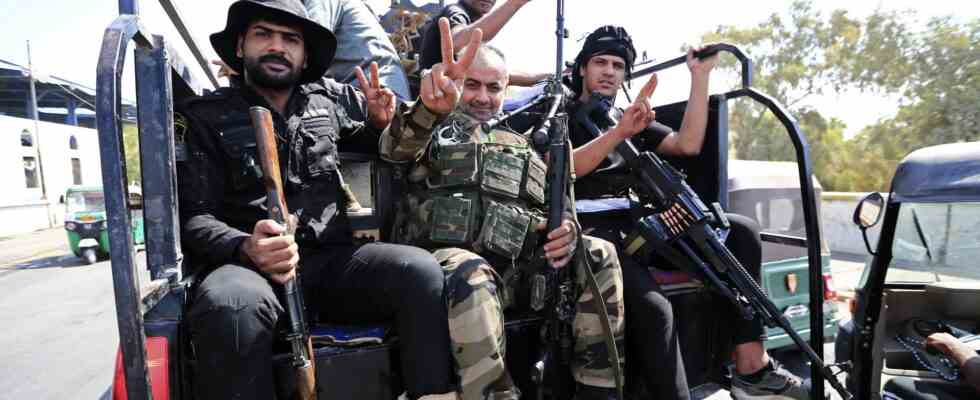Status: 01/21/2023 08:44 a.m
After the US invasion, masses of weapons remained in Iraq. Many of them are now traded on the black market – and almost 20 years after the war they continue to cause violence on the streets of Baghdad.
Haider Hashem takes an old Kalashnikov from his bedroom. The father of a family always has her close by when he is driving a taxi through Baghdad or at home in his small, two-story house on the outskirts of the Iraqi capital.
At night it is usually hidden under the bed, says the 40-year-old. He doesn’t feel safe without the gun. “We simply need weapons here for self-defense. If you don’t have a weapon, you’ll be robbed very quickly – for us it’s almost everyday life.”
When a society collapses
Many people in Iraq are like the father of two sons. A major reason is the collapse of the state after the US invasion in 2003, reports the London-based organization Action on Armed Violence (AOAV), which for years has been investigating the question of where tens of thousands of weapons in Iraq came from and how they managed to disappear .
AOAV head Iain Overton, who was in Baghdad in 2003 as a war correspondent for the BBC, points to a power vacuum created by the invasion.
When longtime ruler Saddam Hussein was overthrown by a US-led military coalition, the Iraqi military also lost power. Many soldiers and officers took their weapons home with them. And numerous unguarded arms caches were looted, Overton reports.
The dictator Hussein and his statues were quickly overthrown in the spring of 2003. But that created new problems in Iraq – until today.
Image: AP
A fatal attempt at stabilization
At the same time, the American and British military tried to stabilize the situation in Iraq as quickly as possible after the invasion. That’s why tens of thousands of weapons were distributed to sympathetic militias and a new security apparatus, AOAV has researched. Democracy was to emerge under high pressure.
In the shortest possible time after the US invasion, weapons circulated in Iraq in large numbers. Just four years later, however, half of them had disappeared without a trace. According to a 2007 report released by the US Department of Defense, 110,000 machine guns and 80,000 pistols that had been issued had gone missing.
After the US invasion, crime in the country increased significantly. Many gangs took advantage of the disintegration of society at the time.
Many weapons and no stability: The conflicts in Iraq are also so difficult to resolve because tens of thousands of weapons in the country are in the hands of private individuals and militias.
Image: AP
Little knowledge of a complex situation
Experts like Overton also blame the US coalition for the fact that violence is still widespread in Iraq today: If you are in a highly unstable situation “whose complexity you, as an occupying power, have hardly any idea,” mean “that you simply only have to put a gun in the hands of the good guys,” it “inevitably ends in absolute chaos,” he says.
But it wasn’t just the US that brought guns into the country. Regional powers such as Iran and Saudi Arabia also equipped Iraqi militias.
Together with what was stolen from the Saddam regime’s warehouses, hundreds of thousands of weapons must have been in circulation at the time, says Overton. And most of these weapons are probably still somewhere in the country today.
Because the situation in Baghdad is so uncertain, central areas such as the so-called Green Zone have to be cordoned off massively.
Image: AFP
Climate of Fear in Baghdad
The Iraq war is long over, but the weapons are still there. And that has devastating effects. In the struggle for influence in Iraq, heavily armed militias repeatedly clash.
Like last summer, for example, when supporters of the Shiite cleric Muqtada al-Sadr fought street battles with the security forces and hostile militias for days. Numerous people died.
A deadly mix
In addition, there is corruption and high unemployment, which can result in frustration or crime for many people. And because there are guns in many Iraqi households, private quarrels quickly turn deadly.
“It often happens that one cousin kills the other,” says the taxi driver Hashem. “At the end you will find a pistol or a machine gun with him. These problems only exist because of the many weapons.”
However, it is not known how often such situations actually occur. There are neither publicly available figures nor studies on the consequences of gun violence in Iraq.
According to observers like Overton, more knowledge is needed to be able to take measures that really have an effect.
expectations of the new government
At the end of October 2022, a new government came to power in Iraq. Expectations are high: Experts as well as citizens are calling on the new Prime Minister Mohammed al-Sudani to consistently enforce the rule of law, strengthen civil society and fight corruption.
This could give people like family man and taxi driver Haider Hashem a feeling of trust in the authorities and of security – even without weapons.
How tens of thousands of weapons were lost in Iraq
Tilo Spanhel, ARD Cairo, currently Baghdad, 20.1.2023 1:35 p.m

